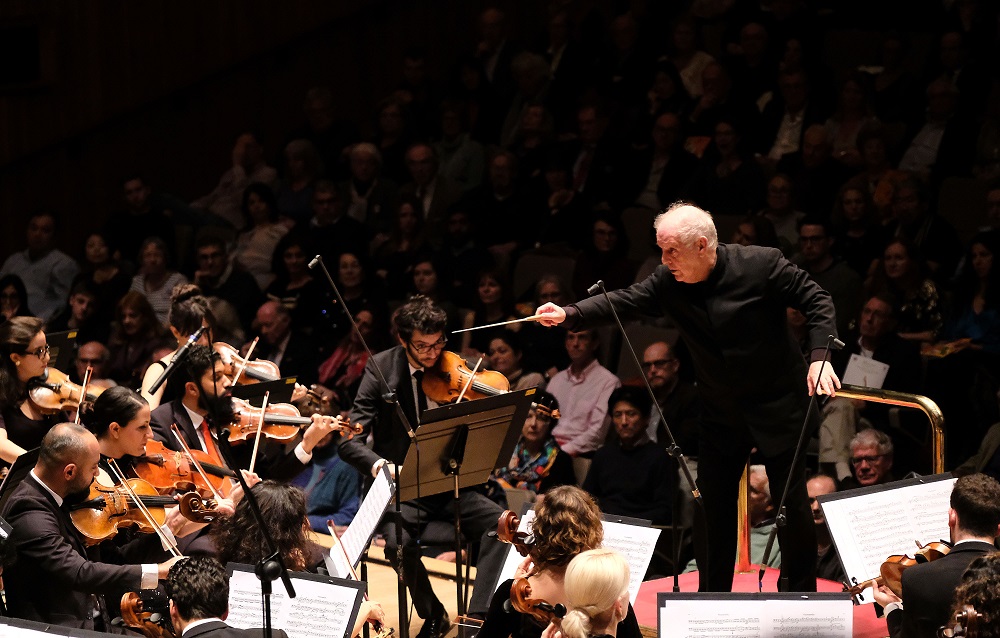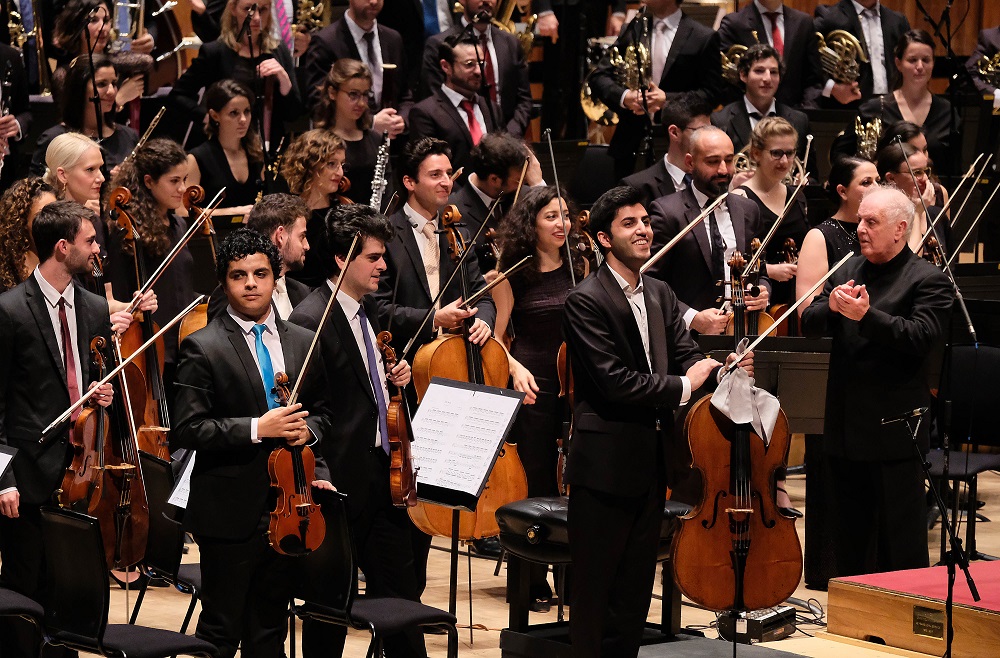Soltani, West-Eastern Divan Orchestra, Barenboim, RFH review - passionate pilgrimages | reviews, news & interviews
Soltani, West-Eastern Divan Orchestra, Barenboim, RFH review - passionate pilgrimages
Soltani, West-Eastern Divan Orchestra, Barenboim, RFH review - passionate pilgrimages
Habemus Quixote: young cellist owns Strauss's and Cervantes' old knight
A legendary name and the chance to change the face of a cruel condition set the stakes high for what Prince Charles, in his programme preface for this Southbank spectacular, told us was called the Stop MS Jacqueline du Pré Tribute Concert.
Soltani can stand as the vibrant figurehead of everything Barenboim has achieved with the West-Eastern Divan Orchestra since 1999, bringing Jewish Israeli musicians together with worldwide Arab and other Muslim players, along with a few Spaniards, in a spirit of fierce collaboration that has survived against the odds. Not all the players looked as if they were quite as engaged as Soltani and his vivacious fellow cellists, but the sound was still impassioned and big: never too much so in Tchaikovsky's urgent battle with Fate as providence, though Barenboim's view of it might seem at times solidly old-fashioned, the equivalent to the Simón Bolívar Symphony Orchestra's thunderous Beethoven Five under Dudamel; in both cases, we've become accustomed to more spring-heeled interpretations. 
He knows he doesn't need to be there for everything, leaning back to enjoy the start of the strings' final victory-parade before sallying back to urge further twists in the fray.While the star soloist of this second half was not the horn in the famous Andante cantabile solo but the first oboist, decorating the return of the movement's first melody with such beautiful freedom, Altani was very definitely the protagonist in Strauss's "fantastic variations on a theme of knightly character". This has to be the composer's most consummate symphonic poem, an opera for orchestra in which muted brass play sheep, two bassoons (both women in this case, three cheers) mendicant monks and oboes in rollicking thirds the garlic-smelling original of Dulcinea del Toboso. My neighbour was disconcerted not to find any full programme of events; the variations and their depictions weren't listed, and the note was too general to tell the audience where it might be at any given point. This of all works cries out for the supertitles the Philharmonia has often provided for detailed orchestral tone-poems or ballet scores.
Still, I guess if you didn't know the action you would have got a very vivid idea of it from Soltani's lead (the cellist taking a bow with his colleagues pictured below). Plunging into adventures with windmills, sheep and unfortunate pilgrims with a vividness that let Barenboim take a back seat, he also found the depth of poetry in the knight's noble vigil at the centre of the work and the deeply moving death scene at the end (a reminder that while a bass-baritone would have to breathe in the sentimental monologue, a cellist doesn't). The sound of his 1694 Stradivarius gave the old idealist all the shining nobility he preserves in his mind, and I've never heard a performance either on disc or live of such perfect intonation. Du Pré's recording, incidentally, is not one of her best, nor was it supposed to be preserved; Adrian Boult stepped in for Otto Klemperer, and the co-ordination is shaky.
Yet when you hear the kind of textural detail at which Barenboim excels - the tendrils of Quixote's ever more discombobulating madness in the introduction, the flights of woodwind which render a (fortunately discreet) wind-machine superfluous as the main duo think they're airborne on a wooden horse - justice to a masterpiece is truly done. And when an Austro-Persian Quixote, emerging from an upturned boat in a roaring river, flicks pizzicato water naughtily in the face of a Russian-Israeli Sancho Panza, both of them figuratively dressed up as Spaniards, justice to one of the most important ongoing humanitarian projects in our riven world is perfectly symbolised, too. I gather Mrs May was in the audience, absorbing the consequences of Don Quixote's ill-advised crusade as well as noting the vital spirit of collaboration between players of many nations, supreme citizens of the world.
rating
Share this article
The future of Arts Journalism
You can stop theartsdesk.com closing!
We urgently need financing to survive. Our fundraising drive has thus far raised £49,000 but we need to reach £100,000 or we will be forced to close. Please contribute here: https://gofund.me/c3f6033d
And if you can forward this information to anyone who might assist, we’d be grateful.

Subscribe to theartsdesk.com
Thank you for continuing to read our work on theartsdesk.com. For unlimited access to every article in its entirety, including our archive of more than 15,000 pieces, we're asking for £5 per month or £40 per year. We feel it's a very good deal, and hope you do too.
To take a subscription now simply click here.
And if you're looking for that extra gift for a friend or family member, why not treat them to a theartsdesk.com gift subscription?
more Classical music
 theartsdesk at the Three Choirs Festival - Passion in the Cathedral
Cantatas new and old, slate quarries to Calvary
theartsdesk at the Three Choirs Festival - Passion in the Cathedral
Cantatas new and old, slate quarries to Calvary
 BBC Proms: Estonian Philharmonic Chamber Choir, Kaljuste review - Arvo Pärt 90th birthday tribute
Stillness and contemplation characterise this well sung late-nighter
BBC Proms: Estonian Philharmonic Chamber Choir, Kaljuste review - Arvo Pärt 90th birthday tribute
Stillness and contemplation characterise this well sung late-nighter
 BBC Proms: Kholodenko, BBCNOW, Otaka review - exhilarating Lutosławski, underwhelming Rachmaninov
Polish composers to the fore in veteran conductor’s farewell
BBC Proms: Kholodenko, BBCNOW, Otaka review - exhilarating Lutosławski, underwhelming Rachmaninov
Polish composers to the fore in veteran conductor’s farewell
 theartsdesk at the Pärnu Music Festival 2025 - Arvo Pärt at 90 flanked by lightness and warmth
Paavo Järvi’s Estonian Festival Orchestra still casts its familiar spell
theartsdesk at the Pärnu Music Festival 2025 - Arvo Pärt at 90 flanked by lightness and warmth
Paavo Järvi’s Estonian Festival Orchestra still casts its familiar spell
 BBC Proms: Batsashvili, BBC Scottish Symphony Orchestra, Ryan Wigglesworth review - grief and glory
Subdued Mozart yields to blazing Bruckner
BBC Proms: Batsashvili, BBC Scottish Symphony Orchestra, Ryan Wigglesworth review - grief and glory
Subdued Mozart yields to blazing Bruckner
 Classical CDs: Hens, Hamburg and handmaids
An unsung French conductor boxed up, plus Argentinian string quartets and baroque keyboard music
Classical CDs: Hens, Hamburg and handmaids
An unsung French conductor boxed up, plus Argentinian string quartets and baroque keyboard music
 BBC Proms: McCarthy, Bournemouth SO, Wigglesworth review - spring-heeled variety
A Ravel concerto and a Walton symphony with depth but huge entertainment value
BBC Proms: McCarthy, Bournemouth SO, Wigglesworth review - spring-heeled variety
A Ravel concerto and a Walton symphony with depth but huge entertainment value
 BBC Proms: First Night, Batiashvili, BBCSO, Oramo review - glorious Vaughan Williams
Spirited festival opener is crowned with little-heard choral epic
BBC Proms: First Night, Batiashvili, BBCSO, Oramo review - glorious Vaughan Williams
Spirited festival opener is crowned with little-heard choral epic
 Interview: Quinteto Astor Piazzolla on playing in London and why Mick Jagger's a fan
Music Director Julián Vat and pianist Matias Feigin compare notes on Piazzolla
Interview: Quinteto Astor Piazzolla on playing in London and why Mick Jagger's a fan
Music Director Julián Vat and pianist Matias Feigin compare notes on Piazzolla
 Classical CDs: Bells, birdsong and braggadocio
British contemporary music, percussive piano concertos and a talented baritone sings Mozart
Classical CDs: Bells, birdsong and braggadocio
British contemporary music, percussive piano concertos and a talented baritone sings Mozart
 Siglo de Oro, Wigmore Hall review - electronic Lamentations and Trojan tragedy
Committed and intense performance of a newly-commissioned oratorio
Siglo de Oro, Wigmore Hall review - electronic Lamentations and Trojan tragedy
Committed and intense performance of a newly-commissioned oratorio

Add comment